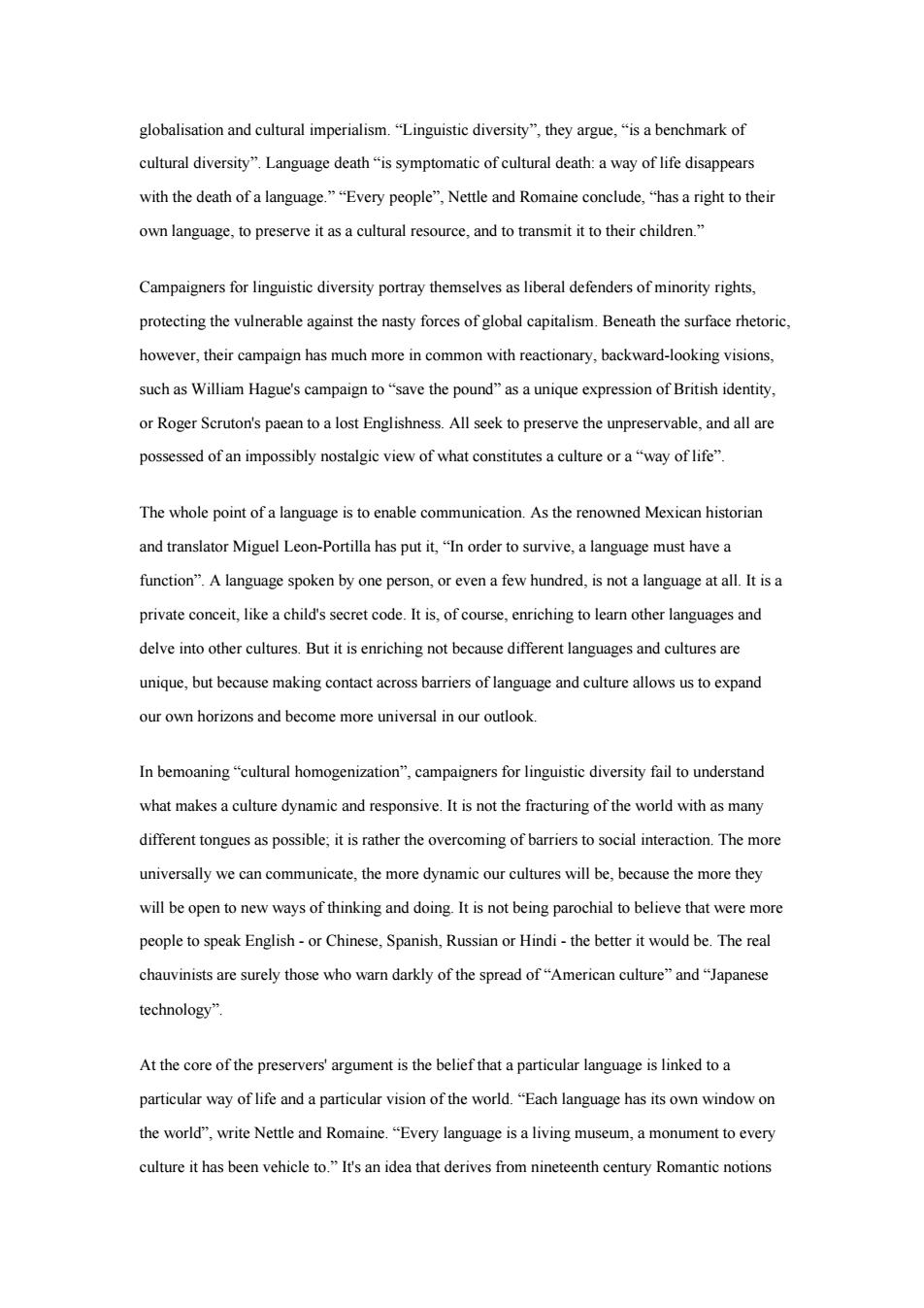正在加载图片...

globalisation and cultural imperialism."Linguistic diversity",they argue,"is a benchmark of cultural diversity".Language death"is symptomatic of cultural death:a way of life disappears with the death of a language.""Every people",Nettle and Romaine conclude,"has a right to their own language,to preserve it as a cultural resource,and to transmit it to their children." Campaigners for linguistic diversity portray themselves as liberal defenders of minority rights, protecting the vulnerable against the nasty forces of global capitalism.Beneath the surface rhetoric, however,their campaign has much more in common with reactionary,backward-looking visions, such as William Hague's campaign to"save the pound"as a unique expression of British identity, or Roger Scruton's paean to a lost Englishness.All seek to preserve the unpreservable,and all are possessed of an impossibly nostalgic view of what constitutes a culture or a"way of life" The whole point of a language is to enable communication.As the renowned Mexican historian and translator Miguel Leon-Portilla has put it,"In order to survive,a language must have a function".A language spoken by one person,or even a few hundred,is not a language at all.It is a private conceit,like a child's secret code.It is,of course,enriching to learn other languages and delve into other cultures.But it is enriching not because different languages and cultures are unique,but because making contact across barriers of language and culture allows us to expand our own horizons and become more universal in our outlook. In bemoaning"cultural homogenization",campaigners for linguistic diversity fail to understand what makes a culture dynamic and responsive.It is not the fracturing of the world with as many different tongues as possible;it is rather the overcoming of barriers to social interaction.The more universally we can communicate,the more dynamic our cultures will be,because the more they will be open to new ways of thinking and doing.It is not being parochial to believe that were more people to speak English-or Chinese,Spanish,Russian or Hindi-the better it would be.The real chauvinists are surely those who warn darkly of the spread of"American culture"and"Japanese technology”. At the core of the preservers'argument is the belief that a particular language is linked to a particular way of life and a particular vision of the world."Each language has its own window on the world",write Nettle and Romaine."Every language is a living museum,a monument to every culture it has been vehicle to."It's an idea that derives from nineteenth century Romantic notionsglobalisation and cultural imperialism. “Linguistic diversity”, they argue, “is a benchmark of cultural diversity”. Language death “is symptomatic of cultural death: a way of life disappears with the death of a language.” “Every people”, Nettle and Romaine conclude, “has a right to their own language, to preserve it as a cultural resource, and to transmit it to their children.” Campaigners for linguistic diversity portray themselves as liberal defenders of minority rights, protecting the vulnerable against the nasty forces of global capitalism. Beneath the surface rhetoric, however, their campaign has much more in common with reactionary, backward-looking visions, such as William Hague's campaign to “save the pound” as a unique expression of British identity, or Roger Scruton's paean to a lost Englishness. All seek to preserve the unpreservable, and all are possessed of an impossibly nostalgic view of what constitutes a culture or a “way of life”. The whole point of a language is to enable communication. As the renowned Mexican historian and translator Miguel Leon-Portilla has put it, “In order to survive, a language must have a function”. A language spoken by one person, or even a few hundred, is not a language at all. It is a private conceit, like a child's secret code. It is, of course, enriching to learn other languages and delve into other cultures. But it is enriching not because different languages and cultures are unique, but because making contact across barriers of language and culture allows us to expand our own horizons and become more universal in our outlook. In bemoaning “cultural homogenization”, campaigners for linguistic diversity fail to understand what makes a culture dynamic and responsive. It is not the fracturing of the world with as many different tongues as possible; it is rather the overcoming of barriers to social interaction. The more universally we can communicate, the more dynamic our cultures will be, because the more they will be open to new ways of thinking and doing. It is not being parochial to believe that were more people to speak English - or Chinese, Spanish, Russian or Hindi - the better it would be. The real chauvinists are surely those who warn darkly of the spread of “American culture” and “Japanese technology”. At the core of the preservers' argument is the belief that a particular language is linked to a particular way of life and a particular vision of the world. “Each language has its own window on the world”, write Nettle and Romaine. “Every language is a living museum, a monument to every culture it has been vehicle to.” It's an idea that derives from nineteenth century Romantic notions